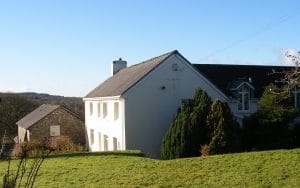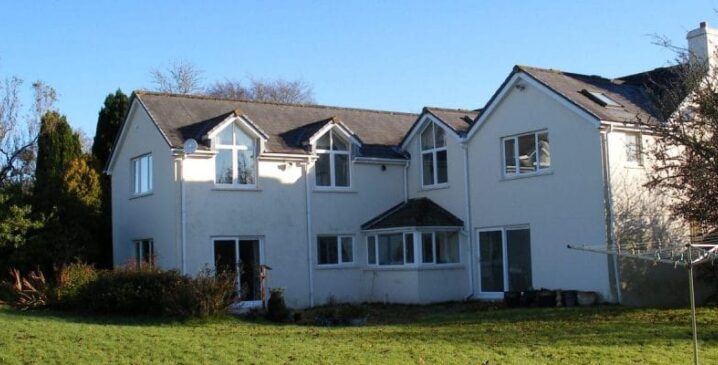
It’s now nearly two months since I and my partner moved into a large house with a half-converted barn on the edge of the Brecon Beacons National Park in South Wales. Our intention was to turn it into a small retreat centre, and we are now well on the way to being ready to welcome our first retreatants in March 2022. Our vision for it, though, is perhaps a bit different from that of other established retreat centres, both Buddhist and non-Buddhist. My partner identifies with the label ‘Buddhist’, whilst I prefer that of ‘Middle Way Practitioner’. There will be a variety of retreats, some with the ‘Buddhist’ and others with the ‘Middle Way’ labels, but what binds them together is the commitment to bringing a range of integrative practices together.
Both from within Buddhist tradition and from beyond it, there is an increasing basis for consensus for the need to combine practices like meditation, the arts, critical thinking, and study in an interdependent way. The Eightfold Path reminds us of the interdependence of different aspects of the path, and so does interdisciplinary thinking, when we manage to get out of disciplinary silos and combine the perspectives of humanities and sciences – especially of such practically important disciplines as psychology, neuroscience, systems theory, and critical thinking education. A path of combined practices is ‘integrative’ in that it helps us to overcome conflicts in our experience – at both an ‘internal’ and a socio-political level. An integrative path also at its heart continually questions the assumption that any one particular perspective, approach, or practice has all the answers. It is thus also a Middle Way path, in the widest sense that it avoids either positive or negative absolute assumptions, whether it is pursued within the context of Buddhist tradition or outside it.
Rather than beginning with too many abstract arguments about the Middle Way, the best way into it for many is to directly experience, not only the benefits of practice, but how practices work together. For example, we might sit in meditation in the morning, and the effect of this is to give us just a little bit more contextual awareness than usual when we get into a discussion later, and someone says something that ‘presses our buttons’. Rather than reacting narrowly against what they are saying, our slightly more open mental state can then be combined with critical thinking skills that enable us to ask appropriate questions about the perspective we react to before we dismiss it. However, a discussion about ideas that are new to us may then leave us with a feeling of having a lot to digest and assimilate. A period of creative writing, or even of creative painting or drawing, might then help us to play around and recognize much more fully what these new ideas actually mean to us in our experience.
At Tirylan House, we are working on creating a space where we hope people can develop in this kind of way. We will not be a place for intensive meditation retreats with long periods of silence (you can do that elsewhere), but we do have a meditation room, and meditation will still form an important part of the programme. Similarly, we have just developed our library, a welcoming study space by the fire with around 3000 books. People might like to come here to focus on study, but again study will not just be a sole pursuit with all the answers – a context of practice can continually help us to use study helpfully, rather than be alienated by academic associations or desiccated by dependence on one academic tradition. A third large room, which we call the ‘sitting room’ will also be a space for music (used mindfully in moderation, not just as background), have an open space for bodywork or flexible discussion, and a comfortable place to sit for a relaxed conversation. Elsewhere we will also have an art material cupboard and a poetry corner. The arts, like the other practices, are not enough by themselves, but can add a crucial element to practice by integrating new meaning into our experience. This is more likely to remain creative when combined with mindfulness practices, and more likely to have a helpful overall direction when combined with reflection and study.

The whole idea of a ‘retreat’, of course, is controversial to some people, who think of it as giving up on the world and our responsibilities in it. My experience is that it is entirely the opposite: as long as we don’t take ‘retreating’ to be an absolute end in itself, and continue to think of it in a wider context of practice, it is a way of addressing our responsibilities to the wider world far more effectively. It does this by boosting our awareness, our understanding, and our commitment to helpful beliefs in a way we then apply when working in the wider world. Retreats can take us far deeper, and get us to examine our assumptions far more, than most other experiences available to us. For that very reason, we can’t entirely forget the struggles of the world beyond when on retreat, and for that reason there will still be sections of our library on the environment and on politics. We also have 17 acres of land attached to the house that we want to turn, not just into a pleasant place for mindful walking, but also into a way of playing our small part in encouraging biodiversity and absorbing carbon, replacing the traditional sheep farming of the district with tree-planting and a forest garden. It is much more important to contextualize the threat to the earth than it is to try to escape from it or merely ignore it for a while.
Starting Tirylan House is also the next step in my own development and the role I have personally been attempting to play in the world. Since 1997, I have been developing a vision of Middle Way Philosophy as a universal approach that I think fulfils a good deal of what people are looking for in Secular Buddhism – namely a way of reconciling Buddhist with scientific insights whilst moving beyond associated dogmas on both sides. This has taken the form of a sequence of books, which I am continuing to publish on a regular basis. It has also taken the form of the Middle Way Society, an attempt to bring together those practically inspired by the idea of the Middle Way rather than just by Buddhist tradition or any other specific tradition. The limitation with these ways of working, however, is one of developing depth. To develop in a contextualizing, practical path beyond dogma, people need to bring their whole bodies and minds to a place where they can focus on that path without distractions for a while. Occasional discussions on the internet may be worth doing, but make little overall impression on our lives and their habits. Even books are rarely read in full with attention and reflection, especially when they are demanding! We often need a more open and reflective context to read open and reflective books. Developing and enabling retreats, which I have already been doing occasionally for some years, is something I now feel is the most worthwhile thing to put more of my energies into.

People may already feel they are familiar with the importance of retreats from a Buddhist context, but for me, it is supremely important that we should be able to go on retreat without selling our souls. There have been too many occasions in the past, on Buddhist retreats, when I have gone along, for instance, with rituals that were not fully meaningful for me, or when the atmosphere in a study group seemed to be more about finding your way to absorbing the guru’s supposed knowledge than it was about critical study as a practice. My aspiration in founding a new retreat centre is that nobody coming here will feel that they have to sell their soul to get the benefits of practice in a focused environment. That will probably sometimes involve quite a lot of negotiation, and even facing up to disagreement, but the Middle Way always begins from where you are now and goes on from there – though perhaps up a challenging incline! The path you may find before you on a retreat is your path, navigating between the extremes of assumption in your experience, not one imposed by someone else who mistakenly thinks they know exactly where it lies.
We already have a schedule for our few retreats at Tirylan House starting in March 2022, though these will start small and only on a donation basis. Our first retreat will be on ‘Archetypes as Inspiration’ to accompany the publication of my new book on the practical understanding of Jungian archetypes without unnecessary speculative beliefs. By later in 2022 we hope to be more fully set up as a social business, and have more accommodation available when we have finished converting our annexe (former barn). For more details about the place and about our retreats, do visit our website. If you are anywhere within travelling distance of Wales, we’d be happy to see you here, whether as a retreatant, volunteer, or guest. We have a lot of practical work to do on the annexe and the land with which voluntary help is greatly appreciated, and we will have plenty of periods between retreats when you could come and stay here to do an individual retreat, or work on a personal writing, study, or artistic project.













2 Replies to “Tirylan House: A new retreat centre for integrative practice”
Hi this is all very interesting but I can’t find the address of Tirylan House anywhere on your website. ‘On the edge of the Brecon Beacons’ is rather vague.?
Let me know if you wouldn’t mind
Anna
Hi Anna, Our full address is on the contact page: https://www.tirylanhouse.org/contact/